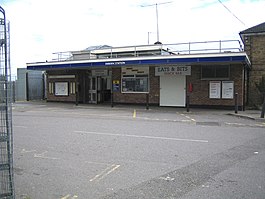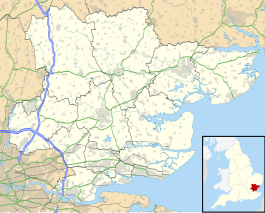Debden tube station
| Debden | |
|---|---|
 Station entrance | |
| Location | Loughton |
| Local authority | District of Epping Forest |
| Managed by | London Underground |
| Number of platforms | 2 |
| Accessible | Yes[1][2] |
| Fare zone | 6 |
| London Underground annual entry and exit | |
| 2019 | |
| 2020 | |
| 2021 | |
| 2022 | |
| 2023 | |
| Railway companies | |
| Original company | Great Eastern Railway |
| Pre-grouping | Great Eastern Railway |
| Post-grouping | London and North Eastern Railway |
| Key dates | |
| 24 April 1865 | Opened as Chigwell Road |
| 1 December 1865 | Renamed Chigwell Lane |
| 22 May 1916 | Temporarily closed |
| 3 February 1919 | Reopened |
| 25 September 1949 | Renamed Debden; BR service replaced by Central line |
| 18 April 1966 | Goods yard closed[8] |
| Other information | |
| External links | |
| Coordinates | 51°38′43″N 0°05′02″E / 51.64527°N 0.08388°E |
Debden is a London Underground station on the Central line in the east of Loughton,[9] in the Epping Forest district of Essex. The station is between Loughton and Theydon Bois. It is located in Station Approach off Chigwell Lane (A1168) and is in Travelcard Zone 6.
History
[edit]The station was originally opened on 24 April 1865[10] by the Great Eastern Railway[11] as part of an extension of the railway's Loughton branch to Epping and Ongar. Initially called Chigwell Road, it was soon renamed on 1 December 1865 as Chigwell Lane,[11] but remained a single-platform halt for the first years of its life. It was the setting for the Victorian ballad The Chigwell Stationmaster's Wife, Chigwell station not having opened until 1903.
Chigwell Lane was one of a number of GER stations that saw a temporary suspension of passenger services, due to the need to make economies during the First World War. The station was closed from 22 May 1916[10][11] until 3 February 1919.[10][11] As a consequence of the 1921 Railways Act, the GER was merged with other railway companies in 1923 to form part of the London & North Eastern Railway (LNER).
As part of the New Works Programme, 1935-1940, the LNER branch was transferred to London Underground, to form part of the eastern extension of the Central line. Although work commenced in 1938 it was suspended upon the outbreak of the Second World War in 1939 and work only recommenced in 1946. British Railways (BR, successor to LNER after nationalisation in 1948) steam services were replaced by electric Central line passenger services on 25 September 1949.[10] From the handover, the station was renamed Debden.[12][13] British Railways goods services continued to be operated on the branch for years afterwards.[14]
The station today
[edit]Debden station operates as an intermediate terminus for eastbound trains from central London, and a number of peak-hours trains terminate at the station rather than continuing to Epping. A turnback siding east of the station allows eastbound trains terminating at Debden to reverse direction and enter the westbound platform to return to central London. The siding may also be used in the reverse direction, allowing westbound trains from Epping to be terminated at Debden during service disruptions and return east.
At one time there were two sidings at Debden and the majority of trains terminated there with a limited service continuing to Epping[citation needed]. However, the Epping service has improved considerably and this has reduced the number of trains terminating at Debden. The present station buildings on the eastbound platform largely date from a reconstruction in 1974, although the original stationmaster's house survives adjacent to the ticket office.
In April 2021, Debden became the 82nd accessible station on the Underground, following the construction of two lifts and a connecting bridge to link the two platforms.[15][16] Work to make the station accessible was first announced in January 2018, as part of a £200m investment plan to increase the number of accessible stations on the Tube.[17]
Connections
[edit]London Buses routes 20, 397 and 677 serve the station, as well as a number of non-Transport for London contracted buses, including routes 66, 418, 418B and 542.
| Preceding station | Following station | |||
|---|---|---|---|---|
| Loughton towards Ealing Broadway or West Ruislip
|
Central line | Theydon Bois towards Epping
| ||
| Historical railways | ||||
| Loughton Line and station open |
Great Eastern Railway Loughton-Ongar |
Theydon Bois Line and station open | ||
Gallery
[edit]-
Looking eastbound towards Epping
-
Looking westbound towards London
-
Roundel on westbound platform
References
[edit]- ^ "Debden Underground station becomes step-free". Transport for London. Archived from the original on 9 April 2021. Retrieved 13 April 2021.
- ^ Standard Tube Map (PDF) (Map). Not to scale. Transport for London. April 2024. Archived (PDF) from the original on 28 May 2024. Retrieved 3 June 2024.
- ^ "Station Usage Data" (XLSX). Usage Statistics for London Stations, 2019. Transport for London. 23 September 2020. Archived from the original on 9 November 2020. Retrieved 9 November 2020.
- ^ "Station Usage Data" (XLSX). Usage Statistics for London Stations, 2020. Transport for London. 16 April 2021. Retrieved 1 January 2022.
- ^ "Station Usage Data" (XLSX). Usage Statistics for London Stations, 2021. Transport for London. 12 July 2022. Retrieved 7 September 2022.
- ^ "Station Usage Data" (XLSX). Usage Statistics for London Stations, 2022. Transport for London. 4 October 2023. Retrieved 10 October 2023.
- ^ "Station Usage Data" (XLSX). Usage Statistics for London Stations, 2023. Transport for London. 8 August 2024. Retrieved 16 September 2024.
- ^ Hardy, Brian, ed. (March 2011). "How it used to be – freight on The Underground 50 years ago". Underground News (591). London Underground Railway Society: 175–183. ISSN 0306-8617.
- ^ "Car park". Archived from the original on 5 May 2013. Retrieved 20 March 2013.
- ^ a b c d Clive's Underground Line Guides – Central Line, dates
- ^ a b c d Butt, R.V.J. (1995). The Directory of Railway Stations. Yeovil: Patrick Stephens Ltd. p. 60. ISBN 1-85260-508-1. R508.
- ^ Rose, Douglas (1999). The London Underground, A Diagrammatic History. Douglas Rose. ISBN 1-85414-219-4.
- ^ Butt 1995, pp. 60, 77
- ^ Clive's Underground Line Guides – Central Line, history
- ^ "Debden underground station to become step-free". Time 107.5 fm. 10 April 2021. Retrieved 13 April 2021.
- ^ "Debden Underground station becomes step-free". Transport for London. 9 April 2021. Archived from the original on 9 April 2021. Retrieved 13 April 2021.
- ^ "Huge boost for accessibility as further 13 stations to go step-free". London City Hall. 19 January 2018. Retrieved 2 February 2018.
External links
[edit]- Rail transport stations in London fare zone 6
- Central line (London Underground) stations
- Proposed Chelsea-Hackney Line stations
- Tube stations in Essex
- Transport in Epping Forest District
- Former Great Eastern Railway stations
- Railway stations in Great Britain opened in 1865
- Railway stations in Great Britain closed in 1916
- Railway stations in Great Britain opened in 1919
- Loughton




